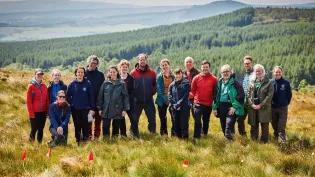Edinburgh has placed fourth globally out of more than 2,000 institutions included in the QS World University Rankings: Sustainability 2026.
Out of the 109 UK institutions in the listing, the University has also ranked as first in Scotland and second in the UK.
The University’s rise in the rankings recognises its ongoing efforts to create a more sustainable world through world-leading research, teaching and learning opportunities, partnerships and innovations.
Influential rankings
It is the fourth year the QS World University Rankings – a leading world league table for the higher education sector – has included sustainability as a framework.
The University’s overall ranking has been determined by the three categories used by the QS to assess institutions: environmental impact, social impact, and governance.
Within the environmental impact category, the University scored higher this year for environmental sustainability, moving from 88.3 to 90.5. The subcategory assesses the University’s academic reputation in environmental studies, the impact of its alumni, and the availability of climate science and sustainability courses.
The University also climbed in the rankings for its social impact outcomes, jumping to sixth from 12th in 2025’s list.
Through initiatives including socially positive investments and a Community Access to Rooms Scheme, the scores demonstrate the progress the University has made to support local communities across the Edinburgh City Region.
Climate commitments
The University is committed to addressing environmental issues by embedding sustainability across every aspect of its activities; from research and teaching, to its operations and estate.
The University has set itself ambitious targets for making strong and lasting contributions to address climate change, including a target to becoming net zero by 2040.
Actions include the institution’s complete divestment from fossil fuels, investment in energy efficiency and renewable energy projects and a long-term project to capture and store unavoidable emissions through restoring peatlands and expanding forests in Scotland.
In 2026 the University will announce its new environmental sustainability strategy. One of the most ambitious plans in the UK Higher Education sector, it will go beyond the previous model of sustainability as damage limitation and set out plans to become regenerative and actively repair environmental systems.
Community benefits
The University continues to engage with Edinburgh’s local communities to address social challenges and deliver positive change.
One initiative is the University’s grants scheme. Since its launch in 2017, more than 330 local projects have received funding, including a community archaeological dig in Dalkeith and support for a charity to provide more than 1,000 counselling sessions in West Lothian.
Earlier this year, the University reaffirmed its social commitments at the launch of a new Community Plan.
Shaped by 18 months of consultation and more than 600 interactions with residents, partners, staff and students, the plan sets out how the University will build on its long tradition as a civic institution.


